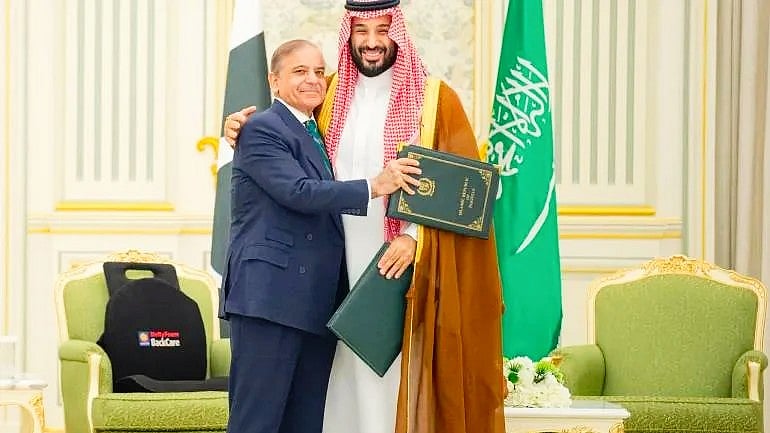Nation
Congress flags Saudi-Pakistan strategic tie-up; here's how it echoes India's 1971 pact with USSR
India signed a mutual defence pact with the Soviet Union under the leadership of former Prime Minister Indira Gandhi in 1971

The Congress on Thursday expressed concern about Saudi Arabia signing a strategic mutual defence tie-up with Pakistan, saying it will have grave implications for India's national security. The party described it as yet another "setback for the much-hyped personalised diplomacy" of Prime Minister Narendra Modi.
In a post on X, Congress MP and general-secretary (communications) Jairam Ramesh said a month after Operation Sindoor was 'abruptly' stopped, US President Donald Trump hosted Pakistan's Field Marshal Asim Munir for lunch at the White House — 'the same person whose incendiary and inflammatory statements directly led to the Pahalgam terror attacks of April 2025'.
"Just a few days after our Prime Minister's much-touted visit to China, President Xi threw open China's secret military complex to Pakistan’s President Asif Ali Zardari. Now, Saudi Arabia, where the Prime Minister was when the Pahalgam terror attacks took place, has signed a 'strategic mutual defence' pact with Pakistan. This, of course, has grave implications for India’s national security. The Indian National Congress notes with concern yet another setback for the much-hyped personalised diplomacy of our Prime Minister," the senior Congress leader posted on X.
Published: undefined
Pakistan and Saudi Arabia have signed a "strategic mutual defence" agreement, which declares that any attack on either country will be considered "an aggression against both".
The agreement was signed by Pakistani Prime Minister Shehbaz Sharif and Saudi Crown Prince Mohammed bin Salman on Wednesday, during the Pakistani leader's day-long visit to the Gulf kingdom, according to a joint statement.
The deal comes days after an Israeli attack on the Hamas leadership in Qatar, a key ally of the United States in the Gulf region.
Published: undefined
"This agreement, which reflects the shared commitment of both nations to enhance their security and to achieving security and peace in the region and the world, aims to develop aspects of defence cooperation between the two countries and strengthen joint deterrence against any aggression," the Saudi-Pak joint statement mentioned.
Commenting on the development, ministry of external affairs spokesperson Randhir Jaiswal said on Thursday that India will study the implications of the move for its national security as well as for regional and global stability.
Published: undefined
Lessons from the past: Indo-Soviet treaty at a glance
Pakistan entering into an alliance with the Saudis is reminiscent of a similar alignment that India strategically entered into under the leadership of former Prime Minister Indira Gandhi.
In August 1971, India broke from its traditional approach of non-alignment when it signed the 'Treaty of Peace, Friendship and Cooperation' with the Soviet Union — an agreement that would become one of the most defining pillars of its Cold War diplomacy.
It was the rising tensions in South Asia, particularly Pakistan’s growing alignment with the United States and China, that motivated India to seek a more secure diplomatic footing.
The treaty provided precisely that: a guarantee of mutual consultation if either party faced an attack or threat, a commitment that carried great weight when conflict erupted later that year in the erstwhile East Pakistan.
Published: undefined
The pact was not framed as a military alliance, yet it conferred India with a signal of deterrence against external intervention. As the United States deployed its Seventh Fleet in the Bay of Bengal and diplomatic pressure mounted during the Bangladesh Liberation War of 1971, the Soviet Union used its veto power in the United Nations and scrambled submarines from its Pacific Fleet, giving India the international backing it needed.
The emergence of Bangladesh at the end of 1971 was not only a political victory, but also validation of this special relationship crafted on shared interests, trust, and strategic calculations.
It is important to note that the legacy of that treaty goes beyond wartime. The partnership that blossomed in areas of defence, industry, science and cultural exchanges rooted itself deeply in the Indian state‑craft of the era.
Soviet technical aid built steel plants and helped fuel India’s nascent heavy industries. Political alignment in international fora cemented India’s role as a power able to act with a degree of autonomy.
Today, as new alliances form in South Asia and beyond, the 1971 treaty stands as a reminder of how India once chose to anchor its security and diplomatic standing based not just on ideology but pragmatic necessity — a record whose echoes still influence its foreign policy calculus.
Published: undefined
Follow us on: Facebook, Twitter, Google News, Instagram
Join our official telegram channel (@nationalherald) and stay updated with the latest headlines
Published: undefined